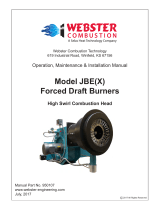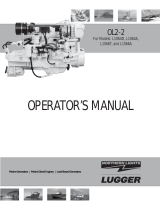Page is loading ...

071R9846
071R9846
Technical data
Oil types: Fuel #2 or lighter fuel
Pressure: With fuel #2:
100-160 psi, 1725 rpm, 3 gal/h
100-210 psi, 3450 rpm, 3 gal/h
With lighter fuel:
Model 3450 rpm: 100-210 psi,
2 gal/h, 100-150 psi, 3 gal/h
Model 1725 rpm: 100 psi, 3 gal/h
Factory setting: 100 psi
Strainer capacity: 3 gal/h
Connection fig. 1
The fuel unit is to be connected as follows:
N=Nozzle port
1
⁄8" NPTF
G=Pressure gage port
1
⁄8" NPTF
S=Suction port/vacuum gage port
1
⁄4" NPTF
R/B = Return port/bleed port
1
⁄4" NPTF
Air bleeding fig. 2
Bleeding is only necessary for 1-pipe
systems. In the case of 2-pipe systems, the
unit bleeds the system automatically
through the return line.
Fig. 1 Fig. 3
Bleeding: Open bleeder max.
1
/2 turn
Fig. 2
Strainer shift
1) Loosen screws
about 1 turn
2) Turn cover
CCW and pull
Bleed plug
The type BFPH fuel unit has a combined
return and bleed plug. If an installation has
to be altered from two pipe into one pipe,
close the return port with original return/
bleed or any standard 1/4" NPT plug.
Pressure adjustment fig. 3
Mounting
Avoid mounting with the shaft pointing
upwards.
Avoid mounting with nozzle outlet pointing
upwards in 1-pipe systems with lift.
Check of cut-off
The cut-off may be checked by mounting
a gage in the nozzle port. There must be a
residual pressure when the burner is shut
down.
The size of this residual pressure should
not be taken as an expression of the quality
of the cut-off.
The quality of the cut-off can be checked
only by looking at the flame at shut down.
The nozzle line must be totally purged.
Automatic By-pass
The type BFPH fuel unit can operate on one
pipe or two pipe installations.
Use of a by-pass plug is not required.
Caution
Maximum pressure on inlet and return line
at the fuel unit must not exceed 30 psi.
A pressure greater than that may cause
damage to the shaft seal. Non-hardening oil
pipe dope is recommended for all thread
connections, as teflon tape pieces may
cause troubles in pump and nozzle. It is
suggested that a quality filter is installed in
the supply line.
Do not use check valves or equivalent
components in oil lines or restrict oil
flow back to the supply tank by any
means, (especially not in gravity feed
systems), unless a means of pressure
relief is installed. Thermal expansion of the
oil during off-cycle/burner shutdown can
create high pressure within the supply line
that can cause damage to the shaft seal
and/or cover of the fuel unit, or to the
piping.
520F0219 - DKBG.PI.010.D9.22 11-2002
INSTRUCTIONS
Fuel unit BFPH

One pipe system
Suction line length
Maximum one-pipe
lift = 8 feet
Line length in feet including vertical and horizontal length:
H = Head in feet
Q = Firing rate (Actual nozzle output) in gal/h
6 – 0.75H
3
⁄8" line length = ––––––––– = feet
0.0086 Q
6 – 0.75H
1
⁄2" line length = ––––––––– = feet
0.00218 Q
If tank is above fuel unit change – to +
Two pipe system
Suction line length
Suction line length in feet including vertical and horizontal length
Pump 3 gal/h
size 1725 rpm 3450 rpm
Lift
3
⁄8" OD
1
⁄2" OD
3
⁄8" OD
1
⁄2" OD
Feet tubing tubing tubing tubing
0’ 150 150 91 150
2’ 132 150 80 150
4’ 114 150 68 150
6’ 94 150 57 150
8’ 74 150 45 150
10’ 57 150 34 134
12’ 37 150 23 90
14’ 19 75 - 45
Spare part list
Code no.
Strainer 071N1392
O-ring for cover sealing 633B0090
Bleed plug 071N1011
Calculation basis:
Viscosity 57 SSU = 9.6 cSt.
Tube wall thickness .035"
Produced by Danfoss G1 advertising agency 02.11 FO-Jn.DS
High pressure relief function
Notice!
BFPH fuel units produced after June 17th
2002, date code 252, have a high pressure
relief function under the cover to protect
the fuel unit and system against high
pressure. The high pressure relief function
releases a few drop-lets of oil at the cover
when the pressure in the oil lines reaches
more than 100 psi. After the high-pressure
is relieved, the relief function closes and the
fuel unit is tight. If the high pressure relief
function has been activated it is a clear
indication that there is a problem in the
system that results in pressure build up.
This can happen by e.g. thermal expansion
of oil or a supply pump with the supply
pressure set too high. Check the system
for:
• Water contamination (risk of ice plugs
and thermal expansion of oil).
• Check valves or other restrictions in the
line/lines without proper pressure relief
back to tank.
• Supply pressure setting in systems with
supply pump.
• Any other restriction that has occured.
• Ensure that outdoor piping is sufficiently
insulated.
All installations must be in accordance
with National and Local Codes.
520F0219 - DKBG.PI.010.D9.22 11-2002
/

